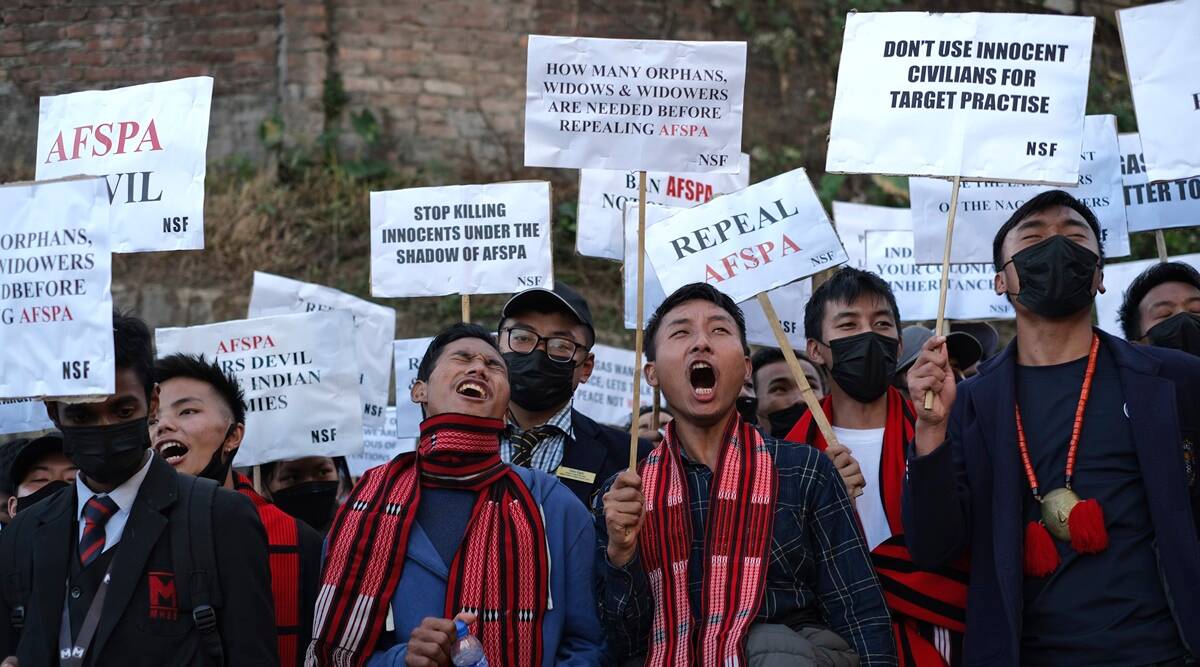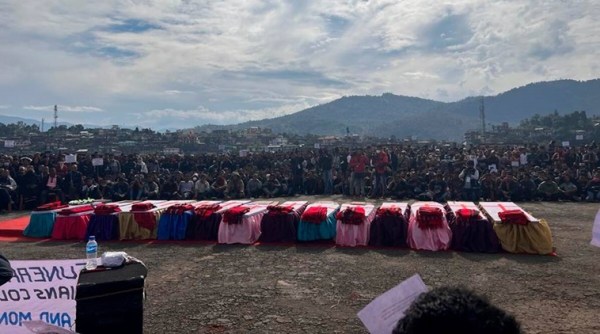 AFSPA remains in force in Nagaland, Manipur, Assam, J&K, and parts of Arunachal Pradesh. (AP/File)
AFSPA remains in force in Nagaland, Manipur, Assam, J&K, and parts of Arunachal Pradesh. (AP/File) The Central government has decided to remove the Armed Forces Special Powers Act (AFSPA) from certain districts in Nagaland, Assam and Manipur. The decision comes in the backdrop of vociferous demands from various states in the Northeast to remove AFSPA following the killing of over a dozen civilians in Mon district of Nagaland last year.
“In a significant step, GoI under the decisive leadership of PM Shri @NarendraModi Ji has decided to reduce disturbed areas under Armed Forces Special Powers Act (AFSPA) in the states of Nagaland, Assam and Manipur after decades,” Union Home Minister Amit Shah said in a tweet on Thursday.
Shah said that the reduction in areas under AFSPA “is a result of the improved security situation and fast-tracked development due to the consistent efforts and several agreements to end insurgency and bring lasting peace in the Northeast under the leadership of Prime Minister Narendra Modi.”
Reduction in areas under AFSPA is a result of the improved security situation and fast-tracked development due to the consistent efforts and several agreements to end insurgency and bring lasting peace in North East by PM @narendramodi government.
— Amit Shah (@AmitShah) March 31, 2022
“Thanks to PM Modi’s unwavering commitment, our northeastern region, which was neglected for decades, is now witnessing a new era of peace, prosperity and unprecedented development. I congratulate the people of Northeast on this momentous occasion,” he added.
Sources in the Ministry of Home Affairs said the withdrawal will come into effect beginning April 1.
According to a PIB release, in Assam, where AFSPA has been in force since 1990, the ‘Disturbed Area’ tag will be removed completely from 23 districts and partially from one district. In Manipur, where civil society organisations and activists have long fought for the law’s repeal, 15 police station areas of six districts will be excluded from the purview of the act. In Nagaland, the Centre has accepted the recommendation of a high-level committee formed in the aftermath of Mon killing to withdraw AFSPA in a phased manner, said the release. Hence, the Disturbed Area Notification is being withdrawn from 15 police stations in seven districts in Nagaland with effect from April 1.
Welcoming the development, Assam Chief Minister Himanta Biswa Sarma said that around 60 per cent of the state’s area will now be free from AFSPA’s purview. “AFSPA has been in force since 1990 and this move marks the beginning of a new chapter in Assam’s future. It is a testimony to the significant improvement in law and order in the State,” Sarma tweeted.
AFSPA has been in force since 1990 & this move marks the beginning of a new chapter in Assam’s future.
It is a testimony to the significant improvement in law & order in the State.
With peace getting primacy, North East is now on a new trajectory of growth & development. 2/3
— Himanta Biswa Sarma (@himantabiswa) March 31, 2022
Nagaland Chief Minister Neiphiu Rio said that he was “grateful” to the government of India for the move. “This is a significant development towards bringing stability, security & prosperity to the North East region,” Rio tweeted.
Grateful to GoI under the leadership of @PMOIndia Shri @narendramodi ji & @AmitShah ji for reducing disturbed areas under AFSPA in the states of Nagaland, Assam & Manipur. This is a significant development towards bringing stability, security & prosperity to the North East region https://t.co/Q81CnpkK0O
— Neiphiu Rio (@Neiphiu_Rio) March 31, 2022
Manipur Chief Minister N Biren Singh, who was recently sworn into office for a second term, called it a “historic decision”, saying it was a “result of the robust development and improved security situation” under Prime Minister Narendra Modi. “This decision will lead to a new era of peace, prosperity and development in Manipur yet again,” he tweeted.
This historic decision is a result of the robust development and improved security situation under various initiatives taken up by Hon’ble PM Shri @narendramodi Ji in the North East.
This decision will lead to a new era of peace, prosperity and development in Manipur yet again.
— N.Biren Singh (@NBirenSingh) March 31, 2022
The government had set up a committee to look into the demand for removal of AFSPA from Nagaland in the wake of Mon killings last year. The committee was supposed to submit its report this month. It is not yet clear if the report has been submitted.
Even as the committee deliberated on the issue, the Centre had extended the imposition of the law in the state by six months in the state last December.
The imposition of AFSPA in Nagaland was due to expire on December 31, as it was last extended in the state on June 30. AFSPA can be imposed in an area or a region for six months at a time, after which it has to be extended if the government deems it necessary.
 The coffins of people killed on December 4 are laid out in a row during a public funeral in Mon, Nagaland, on Monday, Dec. 6. (AP)
The coffins of people killed on December 4 are laid out in a row during a public funeral in Mon, Nagaland, on Monday, Dec. 6. (AP) On December 26, the Centre set up a high-level committee chaired by a Secretary-level officer to examine the possibility of withdrawing AFSPA in Nagaland. The committee was given a deadline of three months.
The committee was set up following protests over the botched up operation in Mon district of Nagaland on December 4, in which six coal miners were killed. After the incident, the Nagaland Assembly passed a resolution for the repeal of AFSPA.
The committee is headed by Registrar General and Census Commissioner of India Vivek Joshi, and includes Additional Secretary in the Union Home Ministry Piyush Goyal, as well as the Chief Secretary and Director General of Police, Nagaland, and the DGP, Assam Rifles, as members.
In 2004, the Jeevan Reddy Committee set up by then Manmohan Singh government had recommended the repeal of AFSPA. Following this, a Cabinet sub-committee was formed to examine the matter. However, the Modi government rejected the recommendations of the Reddy committee and the Cabinet sub-committee was also dissolved.
Since then, no committee either regarding repeal of AFSPA as a whole or with regard to removing it from any state has been formed. Sources in the ministry said AFSPA is imposed or removed in a state fully or partially by the government after due consultation with the state governments, armed forces and the central agencies.
“Due to the continuous efforts of the Central Government …many such steps have been taken in the Northeastern states, which have led to a significant improvement in the security situation and accelerated development. In comparison to 2014, there has been a reduction of 74 per cent in militancy incidents in 2021. Similarly, deaths of security personnel and civilians have also come down by 60 percent and 84 percent respectively during this period,” the MHA statement said.
Notably, Shah has been holding dialogue with all the states of the Northeast on a regular basis not only to resolve boundary disputes but also to bring insurgent groups to the mainstream. “As a result, most of the extremist groups have laid down their arms expressing their faith in the Constitution of India and the policies of the Modi government. Today, all these persons have become a part of the democratic process and are participating in the development of the Northeast. About 7,000 militants have surrendered in the last few years,” the MHA statement said.
AFSPA is imposed in a state or a district only for six months, following which it has to be reviewed. “This is done after taking opinion from states, defence forces and the central agencies. The entire process takes place under the supervision of the home secretary,” an official explained.
Earlier the government had removed AFSPA entirely from Meghalaya and partially from Arunachal Pradesh. In March, 2018, the MHA ordered removal of AFSPA from Meghalaya completely and from eight police station areas bordering Assam in Arunachal Pradesh. A year later, this was further reduced to just four police stations. Arunachal currently has three districts with AFSPA apart from these four police stations.
In the last three years, according to the MHA, the government has signed several agreements to end insurgencies and bring lasting peace to the northeastern states. These include the Bodo Accord of January, 2020, which resolved the five- decades-long Bodo problem of Assam; and the Karbi-Anglong Agreement of September 4, 2021 which resolved the long- standing dispute over the Karbi region of Assam. Similarly, the NLFT (SD) agreement was signed in August 2019 to bring militants into the mainstream in Tripura. After that, a historic agreement was signed on January 16, 2020 to resolve the 23-year-old Bru-Reang refugee crisis, under which, 37,000 internally displaced persons are being resettled in Tripura. On March 29, 2022, another important agreement was signed regarding the boundaries of Assam and Meghalaya which resolved six of the 12 pending disputes.
- The Indian Express website has been rated GREEN for its credibility and trustworthiness by Newsguard, a global service that rates news sources for their journalistic standards.

